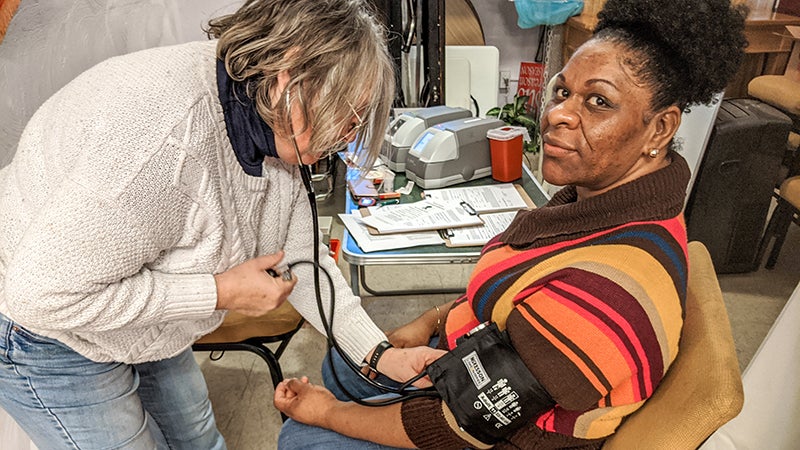Diabetes workshop aims to educate
Published 9:50 pm Monday, November 18, 2019

- Cherri Brunson, right, gets her blood pressure checked by Norine Kuhn of Eastern Virginia Medical School during a diabetes workshop held Saturday at Greater Faith Worship Center.
Cherri Brunson doesn’t have diabetes, but members of her church do.
That’s what brought Brunson out Saturday, and once a month for the past five months to a workshop put on by the American Diabetes Association and Eastern Virginia Medical School to help educate members of the Greater Faith Ministries congregation at 4633 Sleepy Hole Road about diabetes – what it means to be diabetic, who should be tested for diabetes, and what to do if someone learns they have it.
Working in the area of HIV, Brunson began working with Deanie Eldridge, the executive director of the American Diabetes Association for the Virginia and West Virginia area, and Norine Kuhn of Eastern Virginia Medical School in Norfolk and became familiar with the work they do.
With members of her Greater Faith Ministries congregation who are diabetic, Brunson said it was important for the church to hold educational sessions on diabetes.
“This has been a great educational program for me,” Brunson said, “in order to help me with maintaining and to prevent me from becoming a diabetic.”
Eldridge said that while it’s important for people to have a good relationship with their health care team, getting people educated about diabetes in a relaxed setting can go a long way toward helping people manage and treat it.
“In a setting like this, we really talk a lot about meeting people where they are,” Eldridge said. “And that may be where they are within their physical state and where they are within the community setting. This gives opportunities for communities to come together, whether it be a church congregation, or an organization, to be able to have a more informal setting to ask those questions, maybe, that they forget at the doctor’s office, or have been hesitant to ask.”
Within a church setting, it helps build a sense of community, Eldridge said, which allows them to exchange ideas and form a buddy system to help each other.
As part of the educational screenings, participants received books and brochures about diabetes. They heard from doctors about how to treat diabetes, and from a cook about how to prepare meals. EVMS also provided A1C and blood pressure screenings.
Eldridge said the workshops were designed to demonstrate and go into detail about not only what diabetes is, but also how people can manage and prevent diabetes and other chronic diseases through nutrition, proper cooking, physical activity and working with one’s team of medical professionals to determine what medications to take.
She said by doing those things, it can reduce the chances of cardiovascular disease, heart attacks, stroke or other complications.
Eldridge said the workshops are about getting people to look at diabetes, and all chronic diseases, with a team approach.
“It is really looking at the fact that it’s empowering individuals to take control of their health, with diabetes in particular, understanding what the warning signs and risk factors for the disease are,” Eldridge said, “understanding if there’s a family history, that they should definitely be proactive in speaking to their healthcare provider and getting checked regularly, but knowing that there’s hope and that there’s opportunity to really take control of your health through nutrition, through physical activity and having a great relationship with your healthcare team.”
Retired internist Dr. Mack Bonner spoke to a small group of workshop participants on Saturday. He said if people have family histories of diabetes, weight challenges or if they are over age 45, then they should be tested.
Most people, he said, do not understand that pre-diabetes, as well as full-blown diabetes, is a serious problem, but one that can be alleviated with the appropriate lifestyle changes. He said people also do not understand that there are a variety of medications that can help someone with diabetes.
“If found to be diabetic or pre-diabetic, they need to have an individualized, personalized treatment plan,” Bonner said. “That will always involve some dietary changes and an exercise program, and may require medication, but not always.”
The goal, Bonner said, is to diagnose diabetes and pre-diabetes early, and to prevent complications associated with the disease.
Brunson said she has learned valuable information about diabetes, from its origins to how to prepare low-cost meals, even with ingredients from non-traditional stores that sell food, such as dollar stores.
“If you are able to maintain your diet and your lifestyle, you can prevent going on medication,” Brunson said. “And even if you are taking medication, say, for example, the Metformin, you can possibly revert back to not taking it because of your diet and lifestyle changes.”






